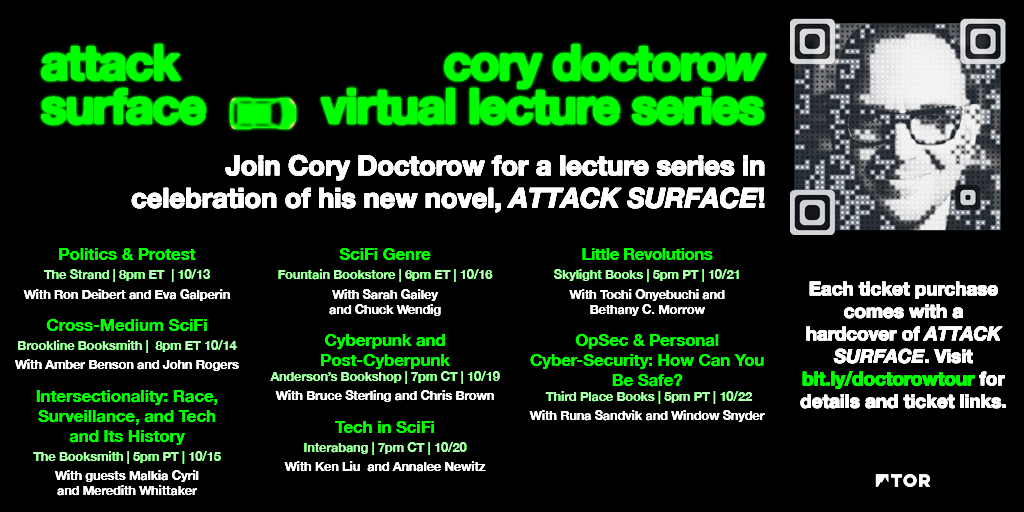
Today's Twitter threads (a Twitter thread).
Inside: Pandemic shock doctrine vs internet freedom; What happened in Florida; Prop 22 is a scam; How to spreadsheet; The Ministry of the Future; and more!
Archived at: pluralistic.net/2020/10/14/fin…
#Pluralistic
1/
Inside: Pandemic shock doctrine vs internet freedom; What happened in Florida; Prop 22 is a scam; How to spreadsheet; The Ministry of the Future; and more!
Archived at: pluralistic.net/2020/10/14/fin…
#Pluralistic
1/

Pandemic shock doctrine vs internet freedom: Freedom House's 2020 report is grim reading.
2/
https://twitter.com/doctorow/status/1316376792404430848
2/

What happened in Florida: Surrender, Bush v Gore style.
3/
https://twitter.com/doctorow/status/1316389479683219456
3/

Prop 22 is a scam: Propping up a Ponzi with a Proposition.
4/
https://twitter.com/doctorow/status/1316402574229008385
4/

How to spreadsheet: All the hard-won lessons in one convenient ruleset.
5/
https://twitter.com/doctorow/status/1316421451805724677
5/

The Ministry of the Future: Eliot Peper interviews Kim Stanley Robinson.
6/
https://twitter.com/doctorow/status/1316425800640540672
6/

Tonight's Attack Surface Lecture: Cross-Medium Sci-Fi with Amber Benson and John Rogers eventbrite.com/e/cory-doctoro…
Full schedule: read.macmillan.com/torforge/cory-…
7/
Full schedule: read.macmillan.com/torforge/cory-…
7/

#10yrsago Webcam spying school settles with students, pays $1.2M in fees and damages eweek.com/security/schoo…
#1yrago Orban humiliated: Hungary’s crypto-fascist Fidesz party suffers string of municipal election defeats theguardian.com/world/2019/oct…
8/
#1yrago Orban humiliated: Hungary’s crypto-fascist Fidesz party suffers string of municipal election defeats theguardian.com/world/2019/oct…
8/
#1yrago China’s new cybersecurity rules ban foreign companies from using VPNs to phone home chinalawblog.com/2019/09/chinas…
#1yrago Apple told TV Plus showrunners to avoid plots that might upset Chinese officials buzzfeednews.com/article/alexka…
9/
#1yrago Apple told TV Plus showrunners to avoid plots that might upset Chinese officials buzzfeednews.com/article/alexka…
9/

Yesterday's threads: Attack Surface is out!; SF as intuition pump; Beyond Cyberpunk; Half-Life's G-Man performs "Once in a Lifetime"; and more!
11/
https://twitter.com/doctorow/status/1316089170482266112
11/

I have a (free) new book out! "How to Destroy Surveillance Capitalism" is an anti-monopolist critique of Big Tech that connects the rise of conspiratorial thinking to the rise of tech monopolies and proposes a way to deal with both:
onezero.medium.com/how-to-destroy…
12/
onezero.medium.com/how-to-destroy…
12/
My ebooks and audiobooks (from @torbooks, @HoZ_Books, @mcsweeneys, and others) are for sale all over the net, but I sell 'em too, and when you buy 'em from me, I earn twice as much and you get books with no DRM and no license "agreements."
craphound.com/shop/
13/
craphound.com/shop/
13/

Upcoming talks:
* Milehicon (Guest of Honor!), Oct 23-5, milehicon.org
* Coding Democracy/Toronto International Festival of Authors, Oct 24 festivalofauthors.ca/event/maureen-…
14/
* Milehicon (Guest of Honor!), Oct 23-5, milehicon.org
* Coding Democracy/Toronto International Festival of Authors, Oct 24 festivalofauthors.ca/event/maureen-…
14/

Recent appearances:
* Savage Lovecast
savagelovecast.com/episodes/729
* Trashfuture: Stolen Likes Acknowledgment
trashfuturepodcast.podbean.com/e/give-me-one-…
* David Pakman: It's Monopolies, Not Surveillance
15/
* Savage Lovecast
savagelovecast.com/episodes/729
* Trashfuture: Stolen Likes Acknowledgment
trashfuturepodcast.podbean.com/e/give-me-one-…
* David Pakman: It's Monopolies, Not Surveillance
15/

My first picture book just came out! It's called Poesy the Monster Slayer and it's an epic tale of bedtime-refusal, toy-hacking and monster-hunting, illustrated by Matt Rockefeller. It's the monster book I dreamt of reading to my own daughter.
pluralistic.net/2020/07/14/poe…
16/
pluralistic.net/2020/07/14/poe…
16/

You can also follow these posts as a daily blog at pluralistic.net: no ads, trackers, or data-collection!
Here's today's edition: pluralistic.net/2020/10/14/fin…
17/
Here's today's edition: pluralistic.net/2020/10/14/fin…
17/
If you prefer a newsletter, subscribe to the plura-list, which is also ad- and tracker-free, and is utterly unadorned save a single daily emoji. Today's is "🌶". Suggestions solicited for future emojis!
Subscribe here: pluralistic.net/plura-list
18/
Subscribe here: pluralistic.net/plura-list
18/
Are you trying to wean yourself off Big Tech? Follow these threads on the #fediverse at @pluralistic@mamot.fr.
Here's today's edition: mamot.fr/@pluralistic/1…
19/
Here's today's edition: mamot.fr/@pluralistic/1…
19/
Today's top sources: Naked Capitalism (nakedcapitalism.com), Four Short Links (oreilly.com/feed/four-shor…), Eliot Peper (eliotpeper.com).
eof/
eof/

• • •
Missing some Tweet in this thread? You can try to
force a refresh






















